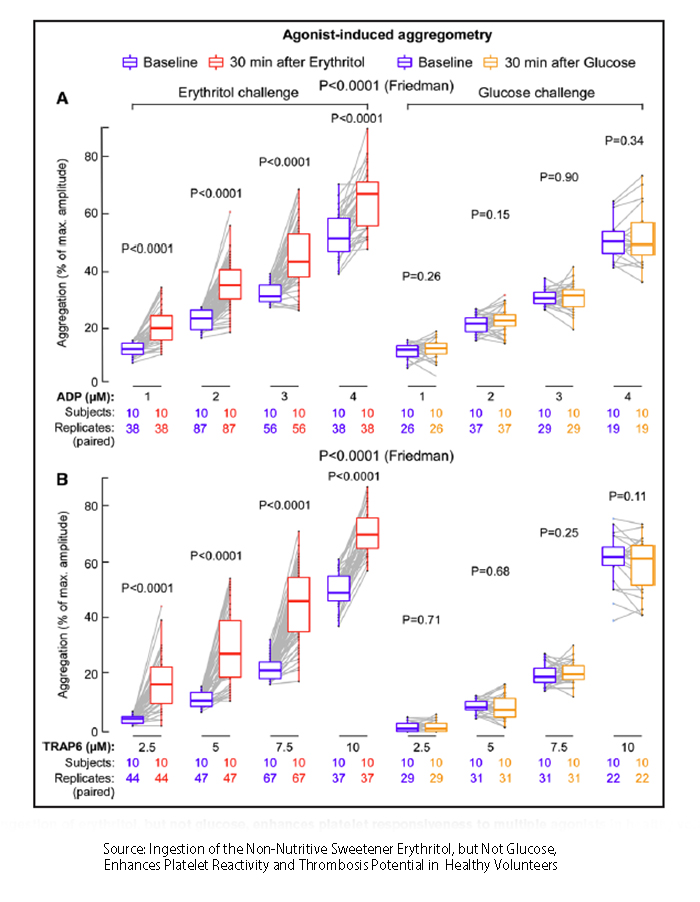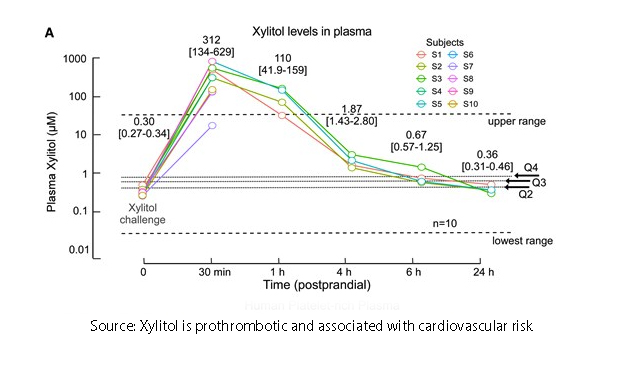
(This companion piece discusses the potential risks of the artificial sweetener erythritol based on a single study. In his article, Dr. Bloom writes about the chemistry of erythritol and other sugar alcohols.)
Erythritol and now xylitol, both advocated as a sugar substitute, especially for individuals with diabetes, are now being questioned for potential harm. Researchers at the Cleveland Clinic have demonstrated an association between these two alcohol sugars and a measure of cardiovascular disease, MACE, mortality, myocardial infarction, and stroke. In two additional studies, they have tried to identify erythritol’s and xylitol’s role to “enhance platelet reactivity and thrombosis potential in subjects.” Given the media reporting, both studies bear a closer look.
The two studies follow a similar pattern to demonstrate a putative role for these two sugar substitutes in increasing platelet activity, the first step in forming a thrombus or clot. Healthy 30-year-olds are given a measured amount of erythritol or xylitol, and then their platelets are tested in vitro for enhanced reactivity.
The erythritol study, reported in Arteriosclerosis, Thrombosis, and Vascular Biology, involves two 10-person groups, roughly half male who, after an overnight fast, drank 300ml (10 ounces) of a solution containing either 30 grams of erythritol or glucose. They found that in comparison to the group drinking glucose
- Erythritol levels quickly increased >1000-fold
- Two in vitro measures of platelet reactivity and, therefore, thrombosis potential also increased

A single dose of erythritol makes platelets, a necessary but insufficient component to clotting, more reactive. But we rarely, if ever, have a single dose of erythritol as a 10-ounce drink over a 2-minute “gulp.” As the authors write,
“Our present studies have several limitations. First, … the study size was small, and replication of results with different cohorts is needed. Further, we did not test long-term changes in platelet function following erythritol consumption.”
The xylitol study features ten healthy volunteers drinking a beverage sweetened with 30 grams of xylitol. Within 15 minutes, xylitol levels again rose 1000-fold but returned to “low-micromolar levels” within 4 to 6 hours.

Again, xylitol increased platelet reactivity, increasing the likelihood of thrombosis in both in vitro testing and in an in vivo mouse model where the carotid artery is injured and the time to thrombosis measured.
Linking xylitol to MACE
To find an association, the researchers searched for blood biomarkers of xylitol in 1100+ individuals undergoing “diagnostic cardiac evaluations,” who were followed for several years. In both a discovery cohort, where the researchers looked for blood biomarkers that might represent risk factors, and the validation cohort, where they re-identified xylitol as a risk factor,
“xylitol showed enhanced relative abundance in subjects who experienced (vs. not) a MACE during the ensuing 3 years of follow-up.”
Both cohorts were enriched for those with coronary artery disease because they underwent diagnostic cardiac evaluations, making any conclusions less generalizable. However, the primary criticism of this association is that roughly 15 grams of xylitol are produced by our bodies (endogenously) in an alternative route of glucose utilization daily. But the dietary intake of xylitol (exogenous) in the discovery and validation cohort was never measured., Are these associated elevated levels from diet or produced “naturally?”
The researchers pre-emptively refute the criticism leveled about their previous erythritol work by concluding that within the range of fasting xylitol levels, platelet responsiveness was heightened – it was the presence of endogenously created xylitol that was of concern and that the addition of exogenous xylitol from foods made the situation worse.
“We also think it important to mention that throughout the evolution of humans, Homo sapiens have not experienced millimolar levels of xylitol in plasma, i.e., until its introduction into our food chain within the past decade or so.”
There is another difficulty in their argument tying the demonstrated enhanced platelet response in the presence of xylitol to the clinical findings of MACE. Platelet aggregation, the first step in the formation of a thrombus or clot, is a necessary but insufficient component of cardiovascular mortality, strokes, or heart attacks.
When we speak of atherosclerosis, we refer to dysregulation or injury along the wall of our arteries, which, in the presence of lipids like LDL cholesterol, form plaques that grow in size, ultimately impeding the blood flow through these vessels. When most individuals consider this explanation, they likely visualize silt gradually filling a riverbed, reducing the ability of boats to travel. But, atherosclerosis does not develop in this gradual way. It progresses in fits and starts.
Atherosclerotic plaque requires oxygen just as all of our tissue does, and as it slowly grows, it often outgrows its blood supply and oxygen. As a result, portions of the plaque may break down and collapse. In the presence of flowing blood, these collapsed areas may allow material to shear off, traveling downstream to clog smaller vessels, a process termed atheroemboli. In some catastrophic instances, the blood flow will lift the collapsed area quickly, creating a far more significant plaque that can occlude the vessel completely. Thrombus or clot formation, instituted by platelets, accompanies these events but rarely by itself is responsible for cardiovascular disease’s death and destruction.
Who Is At Risk?
“The very people who are most at risk for clotting events like heart attack and stroke — people with diabetes — are the very same people who are most likely to be ingesting xylitol in high levels and further increasing that risk without knowing it.”
- Dr. Stanley Hazen, senior author
Xylitol is used as a sugar substitute because it provides the taste of sugar without the calories and has been shown in patients with diabetes to have no impact on glucose or its regulation. In addition to its benefit in controlling cavities (dental caries), Xylitol also has some of the qualities of the GLP-1 antagonists, leading to quicker satiety. Xylitol is found in:
- breath mints
- cough syrup
- children’s and adult chewable vitamins
- mouthwash
- toothpaste
- over-the-counter medicines
- dietary supplements
- some peanut and nut butters
- baked goods
- sugar-free desserts, including "skinny" ice cream
Except for the last three, it is hard to imagine that these products contain enough xylitol to have any impact. Even Dr. Hazen feels comfortable with their use,
“We know that xylitol in your oral care products can help fight cavities. And since you don’t ingest those products in large amounts, they’re still OK to use.”
As a comparator, the 30 grams of xylitol ingested in the platelet enrichment studies is equivalent to a pint of that “skinny” ice cream. How often do you down a pint of ice cream in 2 minutes? And if you do, maybe other dietary choices drive the association with cardiovascular disease.
Again, Dr. Hazen has a more reasonable recommendation than his quotes in the media suggest.
“We need to practice moderation in what we’re consuming. I would argue sugar or honey are actually better alternatives, even for people with diabetes. But if you have diabetes, you need to be vigilant about your glucose levels and keep your intake low.”
Xylitol and its close cousin erythritol may slightly increase your cardiovascular risk. Still, for those individuals with diabetes, there is a distinct tradeoff, and the weight you do not gain while consuming those sugar alcohols may well counteract any additional risk from consuming them.
While erythritol and xylitol might not be the candy-coated saints they were once thought to be, let’s not throw the sugar-free baby out with the bathwater just yet. The real culprit might not be the occasional diet-friendly treat but the assumption that “guilt-free” means consequence-free. Moderation, as always, is the not-so-sweet spot, and unfortunately, moderation is the first to go.
Source: Ingestion of the Non-Nutritive Sweetener Erythritol, but Not Glucose, Enhances Platelet Reactivity and Thrombosis Potential in Healthy Volunteers Arteriosclerosis, Thrombosis, and Vascular Biology DOI: 10.1161/ATVBAHA.124.321019
Xylitol is prothrombotic and associated with cardiovascular risk European Heart Journal DOI: 10.1093/eurheartj/ehae244



